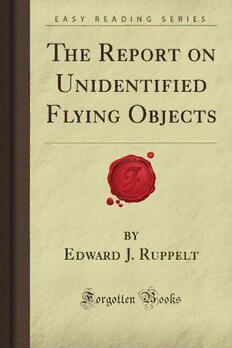
The Report on Unidentified Flying Objects PDF
233 Pages·2008·1.708 MB·English
Most books are stored in the elastic cloud where traffic is expensive. For this reason, we have a limit on daily download.
Preview The Report on Unidentified Flying Objects
Description:
This is Edward J. Ruppelt's memoir of his role in the seminal US Air Force UFO study projects: Projects Sign, Grudge and Blue Book. According to this account, he coined the acronym 'UFO' and put many of the official procedures for reporting and studying UFOs in place. An enjoyable read, this book captures the feel of working for the mid-20th century US military. He describes the changing attitudes of the USAF about UFOs during the early 1950s: wobbling between denial, ridicule, paranoia, and genuine inquiry.A key point of this book is to resolve doubts about the military's role. Ruppelt makes a strong case that UFOs weren't a top secret weapons system; the reports were not disinformation by intelligence agencies; nor was there a concerted effort to cover up UFOs by the US government. Ruppelt does recount many times when the brass tried to dismiss reports without investigating them sufficiently. However, this comes across as simply standard-issue military 'cover-your-ass' behavior, not a vast conspiracy.He gives unique details on some of the most impressive sightings on his watch. These were largely witnessed by highly trained observers such as radar operators, fighter and commercial pilots, astronomers, and other scientists, often during the course of their official duties. The Air Force group that Ruppelt worked for had access to data on top secret balloon launches and test flights, so they were able to sort out which reports could be explained in this way. He consulted with a wide range of scientific specialists, many of whom were in favor of the extraterrestrial hypothesis, and some who were skeptics.Fully a quarter of the reports were still unexplained after this rigorous filtering. Ruppelt is decidedly agnostic, but open-minded, about the reality behind the 'unexplained' sightings. Unlike Keyhoe, he does
See more
The list of books you might like
Most books are stored in the elastic cloud where traffic is expensive. For this reason, we have a limit on daily download.
